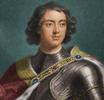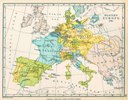 I’m browsing Robert K. Massie’s excellent Peter the Great, a book that won the Pulitzer Prize in 1981, and came again across this quotation that struck me on my first reading years ago. The context is Peter’s trip to western Europe—an unheard of thing for Russian czars to do.
I’m browsing Robert K. Massie’s excellent Peter the Great, a book that won the Pulitzer Prize in 1981, and came again across this quotation that struck me on my first reading years ago. The context is Peter’s trip to western Europe—an unheard of thing for Russian czars to do.
His objective was the Europe that had produced Bacon, Descartes, Leibniz, Milton, Rembrandt, Molière, Leeuwenhoek, Newton, and many other immortals. Russia, by contrast, seemed a backwater of feudalism and medieval stagnation.
So in 1697 the twenty-five year old Peter set off, traveling semi-incognito and declaring “I am a pupil and need to be taught.”
Here is Massie’s description of what Peter the Great saw:
 “What he saw in the thriving cities and harbors of the West, what he learned from the scientists, inventors, merchants, tradesmen, engineers, printers, soldiers and sailors, confirmed his early belief, formed in the German Suburb, that his Russians were technologically backward—decades, perhaps centuries, behind the West. Asking himself how this had happened and what could be done about it, Peter came to understand that the roots of Western technological achievement lay in the freeing of men’s minds. He grasped that it had been the Renaissance and the Reformation, neither of which had ever come to Russia, which had broken the bonds of the medieval church and created an environment where independent philosophical and scientific enquiry as well as wide-ranging commercial enterprise could flourish. He knew that these bonds of religious orthodoxy still existed in Russia, reinforced by peasant folkways and traditions which had endured for centuries. Grimly, Peter resolved to break these bonds on his return” (p. 232).
“What he saw in the thriving cities and harbors of the West, what he learned from the scientists, inventors, merchants, tradesmen, engineers, printers, soldiers and sailors, confirmed his early belief, formed in the German Suburb, that his Russians were technologically backward—decades, perhaps centuries, behind the West. Asking himself how this had happened and what could be done about it, Peter came to understand that the roots of Western technological achievement lay in the freeing of men’s minds. He grasped that it had been the Renaissance and the Reformation, neither of which had ever come to Russia, which had broken the bonds of the medieval church and created an environment where independent philosophical and scientific enquiry as well as wide-ranging commercial enterprise could flourish. He knew that these bonds of religious orthodoxy still existed in Russia, reinforced by peasant folkways and traditions which had endured for centuries. Grimly, Peter resolved to break these bonds on his return” (p. 232).